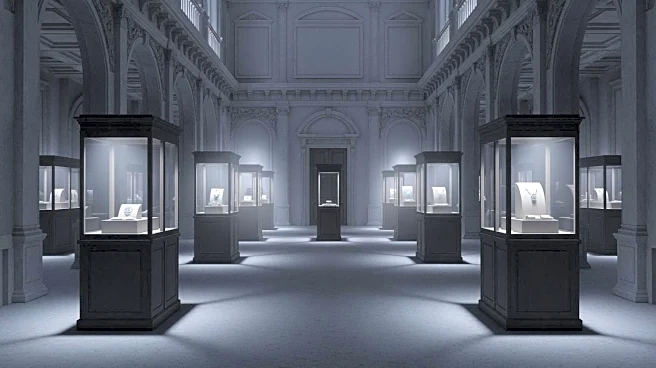What's Happening?
The Louvre Museum in Paris was the target of a significant theft on October 19, 2025, where masked thieves stole several valuable pieces from the French Crown Jewels collection. The heist occurred in broad
daylight, with the thieves using a goods lift to access the museum's Apollo Gallery. They smashed display cases and stole ten items, including a brooch and diadem belonging to Empress Eugénie, along with a royal necklace and earrings. The thieves managed to escape in just seven minutes, prompting a manhunt and leading to the museum's closure for forensic investigations. French politicians have criticized the government for security lapses, and the incident has sparked calls for an independent audit of the museum's security systems.
Why It's Important?
The theft at the Louvre Museum highlights vulnerabilities in the security of cultural institutions, raising concerns about the protection of national heritage. The stolen items are of immense cultural and historical value, and their loss represents a significant blow to France's cultural legacy. The incident has prompted criticism from political figures, who argue that the state has failed to ensure the security of its treasures. This event may lead to increased scrutiny and pressure on museums to enhance security measures, potentially affecting funding and operational priorities. The theft also underscores the ongoing threat of organized crime targeting valuable cultural assets.
What's Next?
In response to the heist, France's police anti-gang brigade will lead the investigation, with efforts to recover the stolen items and apprehend the perpetrators. The Louvre Museum is expected to undergo a thorough security audit, and there may be calls for increased funding to improve security systems. The incident could lead to broader discussions on the allocation of resources for cultural preservation versus other activities. Additionally, the theft may influence security protocols at other cultural institutions, prompting them to reassess their vulnerabilities and implement more robust protective measures.
Beyond the Headlines
The theft at the Louvre raises ethical questions about the prioritization of security in cultural institutions. Critics argue that resources have been diverted from protecting collections to hosting events, which may have contributed to the security lapses. This incident could lead to a reevaluation of the balance between cultural preservation and commercial activities within museums. Furthermore, the theft highlights the challenges faced by museums in maintaining security while accommodating large numbers of visitors, which may necessitate innovative solutions to ensure both accessibility and protection.








